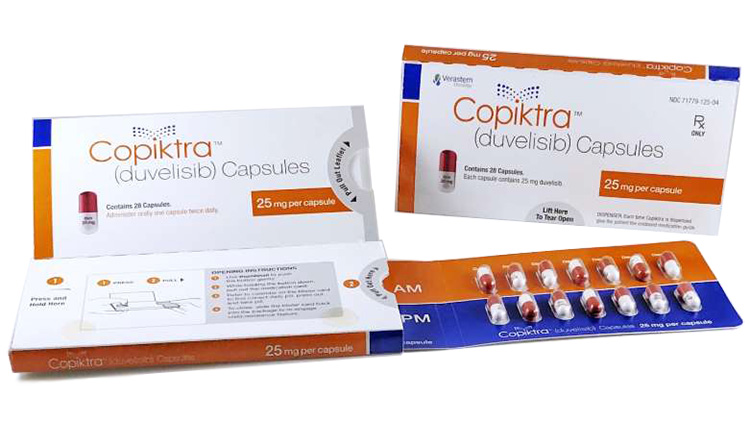Keytruda (pembrolizumab) vs Copiktra (duvelisib)
Keytruda (pembrolizumab) vs Copiktra (duvelisib)
Keytruda (pembrolizumab) is an immune checkpoint inhibitor that works by blocking the PD-1 pathway, which can help the immune system to detect and fight cancer cells, and is commonly used for various types of cancer, including melanoma, lung cancer, and head and neck cancer. Copiktra (duvelisib) is a PI3K inhibitor that targets cancer cells by blocking an enzyme involved in the growth and survival of B-cells, and is used in the treatment of chronic lymphocytic leukemia (CLL), small lymphocytic lymphoma (SLL), and follicular lymphoma. When deciding between Keytruda and Copiktra, it is essential to consider the specific type of cancer, the patient's overall health, previous treatments, and potential side effects, as these medications have different mechanisms of action and are approved for different indications.
Difference between Keytruda and Copiktra
| Metric | Keytruda (pembrolizumab) | Copiktra (duvelisib) |
|---|---|---|
| Generic name | pembrolizumab | duvelisib |
| Indications | Various types of cancers including melanoma, lung cancer, head and neck cancer, Hodgkin lymphoma, and others | Chronic lymphocytic leukemia (CLL), small lymphocytic lymphoma (SLL), and follicular lymphoma |
| Mechanism of action | Programmed death receptor-1 (PD-1) blocking antibody | Phosphoinositide 3-kinase (PI3K) inhibitor |
| Brand names | Keytruda | Copiktra |
| Administrative route | Intravenous infusion | Oral |
| Side effects | Fatigue, musculoskeletal pain, decreased appetite, itching, diarrhea, nausea, rash, fever, cough, dyspnea, constipation | Diarrhea, neutropenia, rash, fatigue, fever, cough, nausea, upper respiratory infection, pneumonia, musculoskeletal pain |
| Contraindications | None known specifically; however, should not be used in patients with hypersensitivity to pembrolizumab or its excipients | None known specifically; however, should not be used in patients with hypersensitivity to duvelisib or its excipients |
| Drug class | Anti-PD-1 monoclonal antibody | PI3K inhibitor |
| Manufacturer | Merck & Co. | Verastem, Inc. |
Efficacy
Efficacy of Keytruda (Pembrolizumab) for Lymphoma
Keytruda, also known by its generic name pembrolizumab, is a monoclonal antibody that has been approved by the FDA for the treatment of several types of cancer, including Hodgkin lymphoma (HL) and primary mediastinal large B-cell lymphoma (PMBCL), a type of non-Hodgkin lymphoma. It works as an immune checkpoint inhibitor, specifically targeting the PD-1 receptor on T-cells. This action helps the immune system to detect and fight cancer cells. In clinical trials, Keytruda has shown significant efficacy in patients with relapsed or refractory classical Hodgkin lymphoma. The response rates for such patients have been encouraging, with a significant proportion achieving partial or complete remission.
However, it is important to note that the efficacy of Keytruda can vary based on the subtype of lymphoma, previous treatments, and the individual patient's health status. In some cases, Keytruda is used when the disease has not responded to other treatments or has relapsed. The use of Keytruda in other types of lymphoma beyond those for which it is currently approved is considered off-label and may not be supported by the same level of evidence as for approved indications.
Efficacy of Copiktra (Duvelisib) for Lymphoma
Copiktra, with the generic name duvelisib, is a small molecule inhibitor of phosphoinositide 3-kinase (PI3K), and is approved for the treatment of adult patients with relapsed or refractory chronic lymphocytic leukemia/small lymphocytic lymphoma (CLL/SLL) and follicular lymphoma (FL) after at least two prior systemic therapies. Duvelisib targets the PI3K-delta and PI3K-gamma isoforms, which are expressed in normal and malignant B-cells. By inhibiting these isoforms, Copiktra disrupts the survival and proliferation of malignant B-cells.
In clinical trials, Copiktra has demonstrated efficacy in patients with relapsed or refractory CLL/SLL and FL. The drug has been shown to provide a benefit in terms of progression-free survival compared to other standard therapies. However, its use is associated with a risk of serious adverse events, which necessitates careful patient selection and monitoring. The effectiveness of Copiktra in other lymphoma subtypes is an area of ongoing research, and its use in such cases would be off-label. As with any medication, the decision to use Copiktra should be based on a comprehensive assessment of the potential benefits and risks for the individual patient.
Regulatory Agency Approvals
Keytruda
-
European Medical Agency (EMA), European Union

-
Food and Drug Administration (FDA), USA

-
Health Canada

-
Therapeutic Goods Administration (TGA), Australia

-
Medsafe (NZ)

Copiktra
-
European Medical Agency (EMA), European Union

-
Food and Drug Administration (FDA), USA

Access Keytruda or Copiktra today
If Keytruda or Copiktra are not approved or available in your country (e.g. due to supply issues), you can access them via Everyone.org.
How it works

Make an enquiry
Choose the medicine you want to buy, answer a couple of questions, and upload your prescription to speed things up. We’ll get back to you within 24 hours.


Make an enquiry
Choose the medicine you want to buy, answer a couple of questions, and upload your prescription to speed things up. We’ll get back to you within 24 hours.


Breeze through the paperwork
We'll guide you through the required documents for importing unapproved medicine, ensuring you have all the necessary information.


Get a personalized quote
We’ll prepare a quote for you, including medicine costs and any shipping, administrative, or import fees that may apply.


Receive your medicine
Accept the quote and we’ll handle the rest - sourcing and safely delivering your medicine.

Some text on this page has been automatically generated. Speak to your physician before you start a new treatment or medication.
Let's talk
If you have any questions, call us or send us a message through WhatsApp or email:
Contact us




